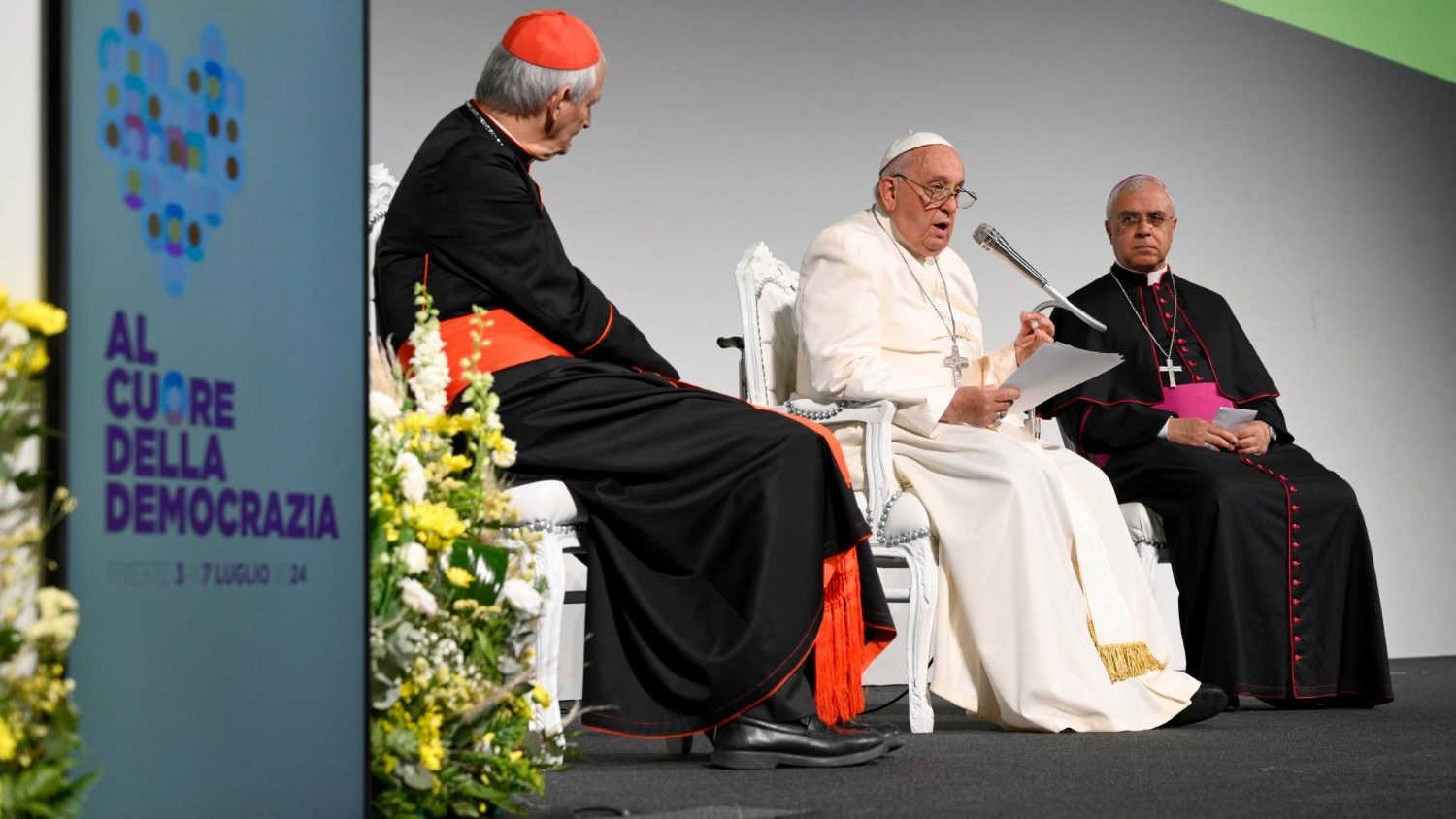‘Democracy is not an empty box,” says pope in Trieste for Social Week
In Trieste, a border city and a crossroads of peoples, the pontiff brought to a close the 50th Social Week of Italian Catholics. The pope met with delegates from across Italy, then celebrated the Angelus in Piazza Unità d’Italia. Participation in democracy “must be taught so that people can develop a critical sense towards ideological and populist temptations.”
Trieste (AsiaNews) – Trieste, the capital of the Friuli-Venezia Giulia region, woke up slowly this morning. People were not too eager to fill the streets, and some shop keepers lazily cleaned their storefront; yet this Sunday was also an historic day, one to wait with bated breath because Pope Francis was coming to town, to bring to a close the 50th Social Week of Italian Catholics, which began on Wednesday with the address by Italian President Sergio Mattarella.
As one get closer to Piazza Unità d’Italia (Italian Unification Square), one sees the traces of the four-day conference (3-7 July) centred on “At the heart of democracy”, posters showing the event’s heart-shaped logo, a few people still wearing their neck strap card holder picked up at the info point four days ago; the " democracy squares” – Ponterosso, Verdi, Hortis – still standing, with the booths that hosted the "good practices" of over one hundred groups from all over Italy.
Streets did seem deserted. But some action could be seen by the sea, around the port area, where the city gets its "vocation of bringing different people together ", to cite the Holy Father. The presence of police and volunteers wearing white vests suggest something special, to protect the city’s largest square, Piazza Unità d’Italia.
The port was off-limits while vehicular traffic was diverted to ensure protection. At 9 am, as the sun rose, bottles of water and hats were handed, while delegates from dioceses across Italy took their seats after meeting the pontiff at the Generali Convention Center at 8 am, for the first event of the day.
Pope Francis, who landed at 7.54 am, was welcomed by the authorities, including Cardinal Matteo Maria Zuppi, who chairs the Catholic Bishops' Conference of Italy, and Bishop Enrico Trevisi of Trieste.
A brief meeting followed with representatives of other Christian denominations and local universities, as well as migrants and people with disabilities, including eight children from Gaza brought to Trieste in a humanitarian airlift.
Afterwards Francis was taken to Piazza Unità d’Italia for the 10.30 am Eucharistic celebration.
The first Social Week of Italian Catholics were held in the city of Pistoia, on the initiative of the Blessed Giuseppe Toniolo. Since then, it has occurred at irregular intervals.
The previous edition took place in Taranto in 2021, focused on “The planet we hope for", about the environment, in response to the pope’s encyclical Laudato Si.
Social Weeks reflect how the Italian Church relates social issues, looking at how Catholic movements translate the social message of the Church into action in light of current realities.
This year’s edition looked at democracy, an extremely topical issue given the declining participation of voters in elections in European countries.
Choosing Trieste was certainly not by chance. The city “is located at the crossroads between Italy, Central Europe, and the Balkans," Francis said at the Angelus after the Mass.
It is a border city, whose Church and civil communities are called to face the challenge "of finding ways to combine openness and stability, overture and identity", starting with people coming via the Balkan route.
In his address to the delegates, Pope Francis shared two thoughts inspired by the heart-shaped logo made up of visibly different people, symbol of the 50th edition. The first concerns democracy as a "wounded heart".
“Every time someone is marginalised, the whole social body suffers. The throwaway culture creates a city with no place [for vulnerable people]," the Holy Father explained. From this point of view, "power becomes self-referential, incapable of listening and serving people.”
Democracy is not only one person one vote, but it is also participation, which "cannot be improvised; it is learnt as children, as young people, and must be taught so that people can develop a critical sense towards ideological and populist temptations.”
“Democracy always requires a transition from taking sides to participating, from cheering to dialogue,” he added.
The second thought consists of an "encouragement to participate", that democracy may be a "healed heart".
"In social life it is necessary to heal hearts. For this reason, we need to exercise creativity," the pontiff said. Indeed, "Democracy is not an empty box, but is tied to the values of personhood, fraternity, and also integral ecology," he said.
The reference to fraternity echoes Francis’s latest encyclical letter, Fratelli tutti, released in October 2020.
Speaking to Catholics, he said: “Have the courage to come up with proposals for justice and peace in public debates,” while being careful not to defend privileges.
On politics, the Holy Father said that it is not about "taking space", but "starting processes".
He went on to urge Catholics not to be "tightrope walkers of the present", but "prophets and builders of the future”. The latter is also the Church’s role.
During the Angelus, Francis spoke again about peace, about which much was said during this Social Week. “From this city,” he said, “we renew our commitment to pray and work for peace: for martyred Ukraine, for Palestine and Israel, for Sudan, Myanmar, and every people who suffer from war.”
Lastly, from Piazza Unità d’Italia, the pontiff invoked "the intercession of the Virgin Mary, venerated on Mount Grisa as Mother and Queen,” his back turned to the altar set, his gaze northwards, towards the National Shrine of Mary Mother and Queen on Mount Grisa, unshakable witness to today's words.







.png)










